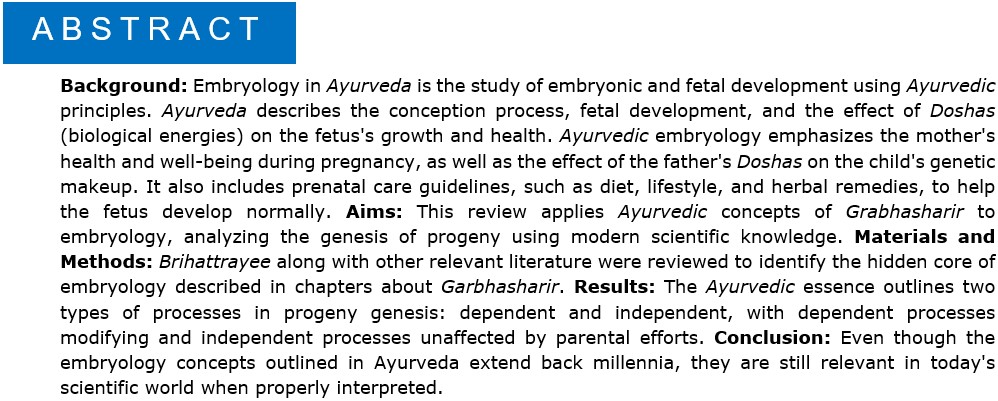Ayurvedic approach to Embryogenesis: Exploring Fetal Development
DOI:
https://doi.org/10.21760/jaims.9.1.29Keywords:
Embryology, Ayurved, Grabhasharir, Brihattrayee, Progeny, Genetic makeupAbstract
Background: Embryology in Ayurveda is the study of embryonic and fetal development using Ayurvedic principles. Ayurveda describes the conception process, fetal development, and the effect of Doshas (biological energies) on the fetus's growth and health. Ayurvedic embryology emphasizes the mother's health and well-being during pregnancy, as well as the effect of the father's Doshas on the child's genetic makeup. It also includes prenatal care guidelines, such as diet, lifestyle, and herbal remedies, to help the fetus develop normally. Aims: This review applies Ayurvedic concepts of Grabhasharir to embryology, analyzing the genesis of progeny using modern scientific knowledge. Materials and Methods: Brihattrayee along with other relevant literature were reviewed to identify the hidden core of embryology described in chapters about Garbhasharir. Results: The Ayurvedic essence outlines two types of processes in progeny genesis: dependent and independent, with dependent processes modifying and independent processes unaffected by parental efforts. Conclusion: Even though the embryology concepts outlined in Ayurveda extend back millennia, they are still relevant in today's scientific world when properly interpreted.
Downloads
References
Ambikadutta Shastri. Sushruta Samhita, Ayurved Tattva Sandipika. Chaukhambha Sanskrit Series Sansthan; 2014. Sharirsthana, Chapter 2, verse 26; Vol. 1:17.
Ambikadutta Shastri. Sushruta Samhita, Ayurved Tattva Sandipika. Chaukhambha Sanskrit Series Sansthan; 2014. Sharirsthana, Chapter 2, verse 49; Vol. 1:23.
Ambikadutta Shastri. Sushruta Samhita, Ayurved Tattva Sandipika. Chaukhambha Sanskrit Series Sansthan; 2014. Sharirsthana, Chapter 1, verse 26; Vol. 1:9.
Ambikadutta Shastri. Sushruta Samhita, Ayurved Tattva Sandipika. Chaukhambha Sanskrit Series Sansthan; 2014. Sharirsthana, Chapter 3, verse 4; Vol. 1:26.
Ambikadutta Shastri. Sushruta Samhita, Ayurved Tattva Sandipika. Chaukhambha Sanskrit Series Sansthan; 2014. Sharirsthana, Chapter 3, verse 9; Vol. 1:27.
Ambikadutta Shastri. Sushruta Samhita, Ayurved Tattva Sandipika. Chaukhambha Sanskrit Series Sansthan; 2014. Sharirsthana, Chapter 2, verse 34; Vol. 1:19.
Tripathi Brahmanand. Charak Samhita, Charak Chandrika Hindi commentary. Chaukhambha Sanskrit Series Sansthan; 2014. Sharirsthana, Chapter 4, verse 5; Vol. 1:875.
Tripathi Brahmanand. Charak Samhita, Charak Chandrika Hindi commentary. Chaukhambha Sanskrit Series Sansthan; 2014. Sharirsthana, Chapter 5, verse 5; Vol. 1:897.
Tripathi Brahmanand. Charak Samhita, Charak Chandrika Hindi commentary. Chaukhambha Sanskrit Series Sansthan; 2014. Sharirsthana, Chapter 4, verse 9-25; Vol. 1:878-886.
Tripathi Brahmanand. Charak Samhita, Charak Chandrika Hindi commentary. Chaukhambha Sanskrit Series Sansthan; 2014. Sharirsthana, Chapter 4, verse 27; Vol. 1:887.
Tripathi Brahmanand. Charak Samhita, Charak Chandrika Hindi commentary. Chaukhambha Sanskrit Series Sansthan; 2014. Sharirsthana, Chapter 4, verse 18; Vol. 1:8.
Tripathi Brahmanand. Charak Samhita, Charak Chandrika Hindi commentary. Chaukhambha Sanskrit Series Sansthan; 2014. Sharirsthana, Chapter 3, verse 17; Vol. 1.
Ambikadutta Shastri. Sushruta Samhita, Ayurved Tattva Sandipika. Chaukhambha Sanskrit Series Sansthan; 2014. Sharirsthana, Chapter 2, verse 53; Vol. 1:23.
Tripathi Brahmanand. Charak Samhita, Charak Chandrika Hindi commentary. Chaukhambha Sanskrit Series Sansthan; 2014. Sharirsthana, Chapter 2, verse 30; Vol. 1.
Ambikadutta Shastri. Sushruta Samhita, Ayurved Tattva Sandipika. Chaukhambha Sanskrit Series Sansthan; 2014. Sharirsthana, Chapter 4, verse 61; Vol. 1:49.
Chaurasia BD. Human Anatomy. 4th ed. New Delhi: CBS Publishers; 2006. Vol. 2:356.
Ghodke Y, Joshi K, Patwardhan B. Traditional Medicine to Modern Pharmacogenomics: Ayurveda Prakriti Type and CYP2C19 Gene Polymorphism Associated with the Metabolic Variability. Evidence Based Complementary Alternative Med. 2011 June 8;2011:249528.
Govindaraj P, Nizamuddin S, Sharath A, et al. Genome-wide analysis correlates Ayurveda Prakriti. Sci Rep. 2015;5:15786. https://doi.org/10.1038/srep15786














